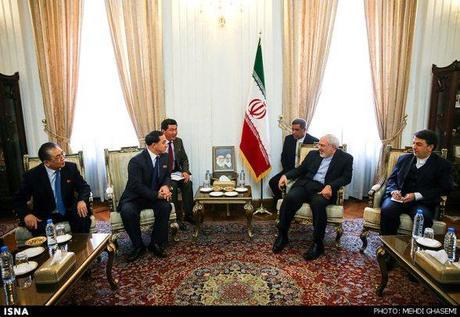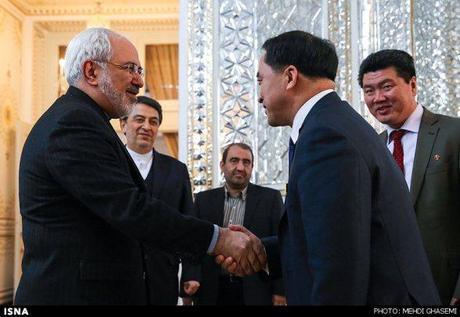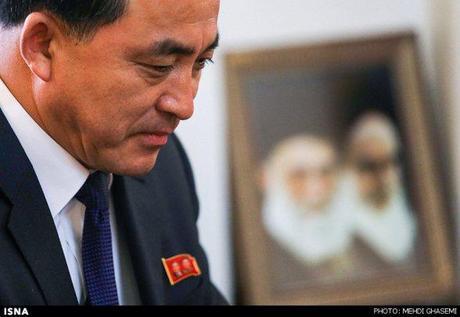
DPRK Vice Foreign Minister Ri Kil Song (2nd L) meets with Iran’s Foreign Minister Mohammad Javad Zarif (2nd R) in Tehran on 24 February 2014 (Photo: Mehdi Ghasemi/ISNA/The Iran Project).
Iran’s Foreign Minister Mohammad Javad Zarif met with a delegation of the DPRK Foreign Ministry led by Vice Minister Ri Kil Song in Tehran on 24 February (Monday). At the meeting Ri and Zarif discussed expanding DPRK-Iran economic and trade relations and Zarif restated Iran’s support for unification between the DPRK and ROK.
According to FARS, “the Iranian foreign minister and the North Korean deputy foreign minister explored avenues for bolstering and reinvigorating the two countries’ bilateral ties.” Zarif noted that “the two states’ common views over a number of regional and international issues” and “stressed Tehran’s determination to establish sustainable relations with Pyongyang.” He also said that “continued consultations and exchange of views between the two countries’ senior officials is a necessity to this end” and “expressed the hope that the North and the South would remove their misunderstanding through peaceful means, specially through talks.” Zarif “reminded [Ri] that resolution of misunderstandings in the Peninsula would serve the interests of both nations and help preserve peace, security and stability in the region. He also “stressed Iran’s firm stance on global nuclear disarmament,” but “underlined all countries’ entitlement to the right to benefit from the peaceful nuclear technology.” According FARS, Ri Kil Song pointed out that “Pyongyang’s high-ranking officials pay special attention to the consolidation and expansion of ties with Iran. ” He also said that “The people and government of (North) Korea have always wanted the success and increasing progress of Iran; they have always supported Iran’s peaceful nuclear policy and opposed imposition of political and economic pressures on the country.”

Iran’s Foreign Minister Mohammad Javad Zarif (L) shakes hands with DPRK Vice Foreign Minister Ri Kil Song in Tehran on 24 February 2014 (Photo: Mehdi Ghasemi/ISNA/The Iran Project).

DPRK Vice Foreign Minister Ri Kil Song in Tehran on 24 February 2014 (Photo: Mehdi Ghasemi/ISNA/The Iran Project).
According to IRNA, Mohammad Javad Zarif said that Iran “is hopeful that the current misunderstanding in the Korean Peninsula will be resolved through peaceful means and dialog to help upgrade the living standard of people and help restore tranquility, stability and security of the region” and that “Tehran is determined to continue with relations with Pyongyang mainly in the economic sector.” Zarif also said that the “exchange of views between the two sides officials on regional and international issues is necessary” and he “called for disarmament and freeing the world from nuclear weapons and underlined the legitimate rights enshrined by Non-Proliferation Treaty for the member states to produce peaceful nuclear energy.” Ri Kil Song “conveyed the warm greetings of his country’s foreign minister to Zarif and underlined that his country’s high ranking officials call for improved relations with Tehran” and ”thanked Iran for the support to the Democratic Peoples Republic of Korean nation and government and said that DPRK backs Iran’s peaceful nuclear activities and are against imposing political and economic pressure on Iran.” According to IRNA, Ri also “briefed the Iranian foreign minister of the latest developments in his country.”
In early February 2014, Mohammad Javad Zarif was lambasted by a conservative Iranian politician after a rumor emerged that Iran and Zarif canceled a visit by a Korean People’s Army [KPA] delegation to Tehran because of pressure from the US. According to a 5 February broadcast by Tehran Mehr News Agency, Hoseyn Ali Haji-Daligani said that “”The government’s policy on foreign relations has taken us to a point where the US ambassador to the United Nations writes a letter to the [Iranian] Foreign Ministry and says the North Korean delegation should not pay a visit to Iran. The Foreign Ministry has obeyed the order by the US ambassador to the United Nations and has told the Armed Forces that it is not a good time for the [North] Korean delegation to come to Iran. This is a profound humiliation for Mr. Zarif” and that “We expected the West to become bolder following the Geneva negotiations. Following the negotiations and the publication of the Joint Action Plan, the West became bolder to the extent that its ambassador to the United Nations dictates to us what to do about the [planned] visit of the [North] Korean delegation.”
Filed under: Uncategorized
